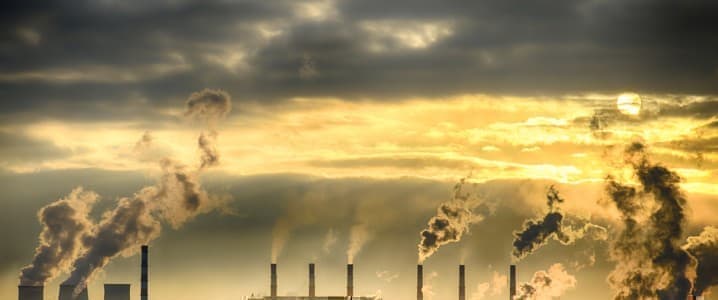As a worldwide community we are--and have been--at a point of no return for climate change. To date, while the world has made incremental progress toward curbing global greenhouse gas emissions, these efforts have not been nearly impactful enough to make a significant dent in the work that needs to be done to avoid letting the world warm more than 1.5 degrees Celsius over pre-industrial averages (the goal set by the Paris accord and other major climate change scientists, think tanks, and policymakers).
Speaking of major climate change scientists, think tanks, and policymakers, however, there has been a sea change in the messaging that those groups are putting out about catastrophic climate change and the global economy’s potential to stop it. The event that changed their tune and gave climate change think pieces an air of optimism and concluding paragraphs full of silver linings? COVID-19.
Historically, the momentum of business-as-usual economics has been all but impossible to budge. However, the novel coronavirus pandemic did just that--it disrupted the worldwide economic status quo in a way that no human intervention has been able to. This pause and newfound doubt in the system as it is created an opportunity to rewrite our future.
Many experts think that these extraordinary circumstances provide a once-in-a-lifetime opportunity to reroute the global economy toward decarbonization and build toward what the World Economic Forum has advocated as a “new energy order” and a “great reset.” The World Economic Forum is not alone in this belief. As we speak, high-profile international agencies such as the United Nations, the International Energy Agency (IEA), and the European Union are all either considering or drafting green stimulus plans. Even a surprising number of blue-chip companies are advocating for a green energy stimulus.
Related: What BP Got Wrong About Global Oil Demand
And now, there is a brand new report from the IEA released just this week that underlines the urgency and importance of actually making good on these policy recommendations. As Modern Diplomacy sums up the Wednesday report: “A major effort to develop and deploy clean energy technologies worldwide is urgently needed to meet international energy and climate goals, particularly in order to reduce carbon emissions from areas beyond the power sector such as transport, buildings and industry.”
“With global carbon emissions at unacceptably high levels,” the Energy Technology Perspectives 2020 report calls for a sweeping restructuring of the global energy system in order to “achieve the rapid and lasting decline in emissions called for by the world’s shared climate targets.”
It’s hard to overstate the magnitude of the necessary changes. After an analysis of over 800 different technologies and their potential for transitioning global industry to net-zero emissions by the year 2070, the IEA found that even if the power sector transitioned completely to clean energy, we would only be one-third of the way to reaching this goal. “Completing the journey will require devoting far more attention to the transport, industry and buildings sectors, which today account for about 55% of CO2 emissions from the energy system. Much greater use of electricity in these sectors – for powering electric vehicles, recycling metals, heating buildings and many other tasks – can make the single largest contribution to reaching net-zero emissions, according to the report, although many more technologies will be needed.”
IEA Executive Director Dr. Fatih Birol, however, echoed the sentiment of optimism brought on by the COVID-19 disruption. “Despite the difficulties caused by the Covid-19 crisis, several recent developments give us grounds for increasing optimism about the world’s ability to accelerate clean energy transitions and reach its energy and climate goals. Still, major issues remain. This new IEA report not only shows the scale of the challenge but also offers vital guidance for overcoming it,” she was quoted as saying by Modern Diplomacy.
Related: China Not Looking To Ban Gasoline Powered Cars Any Time Soon
All this is to say that while clean energy and energy-efficient technologies have been advancing rapidly over the past few decades, they need to pick up the pace in a major way. “Ensuring that new clean energy technologies are available in time for key investment decisions will be critical. In heavy industries, for example, strategically timed investments could help avoid around 40% of cumulative emissions from existing infrastructure in these sectors. Accelerated innovation is crucial for this – and for scaling up the clean energy technologies needed across the energy system.”
While COVID-19 energy transition optimism is well-founded, it does not mean that the transition will be easy. The magnitude of the transformation needed is staggering, but it’s also just that--needed. And, in many cases, it’s completely within reach.
By Haley Zaremba for Oilprice.com
More Top Reads From Oilprice.com:
- The Future Of Fracking In The United States
- Is This The Cleanest Energy On Earth?
- Why GM’s Wireless Battery Could Be A Gamechanger



















Environmental activists and divestment campaigners have to accept that an imminent global energy transition from oil and gas to renewables and also zero emission are illusions. They better understand that transition is already happening in a gradual way. Furthermore, we are already witnessing the demise of the biggest polluter: coal. With time global electricity will be totally generated by renewable and nuclear energy. Global transport and petrochemicals are a different story altogether.
Furthermore, there will be neither a global economy nor civilization as we know and enjoy without oil and gas and vice versa. Anything else is a myth.
And while the COVID-19 pandemic was a defining moment in terms of its destructive power and impact on the global economy and human activities, it will soon be history like Aids, Ebola, and Sars viruses with the advent of anti-COVID vaccines. Therefore, the pandemic could hardly be a game changer for climate change.
Dr Mamdouh G Salameh
International Oil Economist
Visiting Professor of Energy Economics at ESCP Europe Business School, London